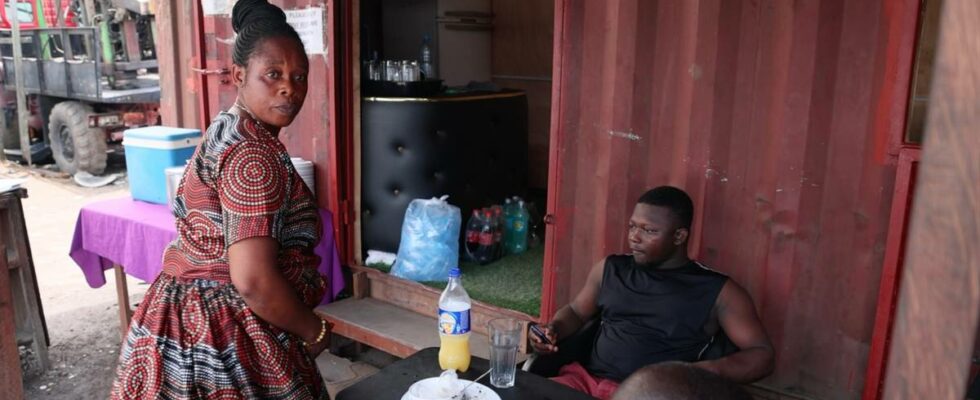– Everything on the market has become more expensive. Transport has become more expensive. The same with the stream. Veronica Lum strikes out with armane. She feels it every single day. She doesn’t get much income from her tiny cafe, and therefore every single kroner is valuable. Veronica Lum has many customers every day, but as prices increase, it becomes increasingly difficult to run a cafe. Photo: Luke Dray / news Together with millions of other Africans, she lives with the consequences of a problem that she neither created, nor can solve herself. – This is not unique to developing countries, says financial analyst Trevor Hambayi. Hambayi has over 20 years of experience in Zambian financial life, and is an adviser to large companies that want to establish themselves in the country. Photo: Luke Dray / news He ends up in Zambia, half a continent away from Veronica, but in country after country in Africa many experience the same challenges. High interest rates on government debt, as well as more expensive fuel, are helping to push prices up in most African markets. – The main challenge is that, especially on the African continent, investments are often made in social development, something that does not contribute to income so that you can pay for the loans you take out, explains Hambayi. 31 out of 37 countries on the World Bank’s debt crisis list are African. Infrastructure for pleasure and pain A stadium. A motorway. A railway. A hospital. Or an airport. All of this is important for most countries, especially if you want development. In the long term, this type of investment can be good for both trade, transport and social life. But Hambayi points out that such large loans can quickly mean trouble in African economies. In addition to the fact that such investments rarely yield returns, he highlights some other key challenges: Politicians think too short-term, and are willing to take out large loans to build their “prestige project” while they are in power. There is often a lack of good enough mechanisms to keep a full overview of a state’s debt burden. It will be like a teenage family where everyone uses their own credit card. The lack of control can mean trouble. Corruption is still a problem, and particularly so with large development projects such as the large government loans that usually go to them. Money disappears on the way to the goal, and the price tag is much higher than budgeted. In recent years, several African countries have experienced that bonds, i.e. loans, have started to mature, without them having the money to pay them off. This has weakened several exchange rates, which in turn causes all imported goods to become more expensive. The fact that it is also “animal time” elsewhere in the world has a strong impact on import-dependent markets. – 70 percent of all goods we use in this country are imported. So any increase in international prices also affects this country, says Hambayi, who is based in Lusaka in Zambia. Shrinkflation On top of this, petrol prices have increased, so that even locally produced goods have become more expensive. Because even the smallest tomato or cob of corn must somehow be transported from the farmer to the market, and on to people’s homes. – It really affects my life, says cafe owner Veronica Lum. First you have to buy some broth which has gone from 800 to 900 Central African francs. Then you will have egusi, which used to cost 300, and now it costs 400-500 Central African francs. She continues to list items that have gone up in price. She notices it particularly well on the food front, since she runs a small cafe where she needs the ingredients to make a good, nutritious meal. – If I raise my prices, the customers will not come. So I rather reduce the quantity for each meal, Veronica explains. The same thing – shrinkflation – you can see in many places on the continent. Also on the market in Zambia, sellers have put less sugar and cooking oil in the bags they sell than before. Values disappearing from Africa In recent years, several African economies have become far more dependent on China than before. After a debt crisis in 2008, China was among the few who wanted to give loans to a number of African countries. Often Chinese loans were given at the same time as Chinese companies built roads, railways and other infrastructure that the large loans were supposed to finance. China offered both urgent financing and expertise. Many are skeptical of the long-term consequences of having made themselves economically dependent on China. Another challenge is that many large African companies have owners who live far away from Africa. – 60 percent of the ownership of all the mines in this country belong to foreigners. So in the end, the values we create are taken out of the country, and that creates extra pressure on our economy, says financial analyst Hambayi. He believes African politicians have a big job ahead of them. Both by handling large loans, creating development and at the same time not selling off national values and the company to investors far away. Veronica in Cameroon does not have much trust in the politicians, and has more than enough to get food on the table for both herself and the customers in the cafe. – We get no help, only higher taxes. The governing authorities should ensure us free education and hospitals. As it is now, it is too difficult to give our children an education, Veronica concludes. Here is more content from news abroad: Published 15.06.2024, at 13.11
ttn-69
“Everything” has become more expensive everywhere in Africa – news Urix – Foreign news and documentaries

